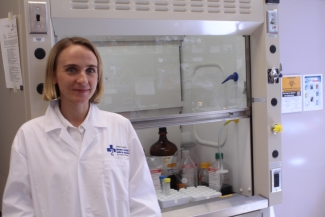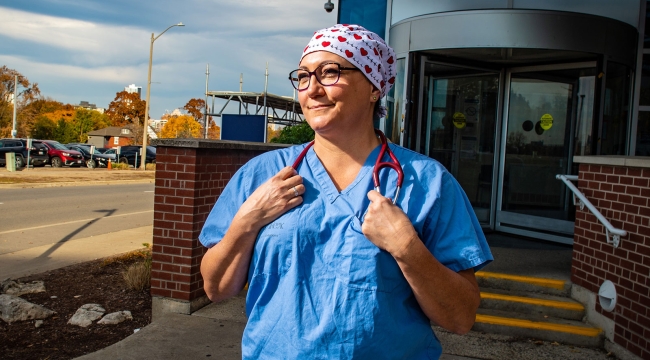Cord blood researcher helping to fight blood cancers
Umbilical cord blood donations fuel Dr. Marjorie Brand’s study of blood diseases and cancers
Umbilical cord blood, a material that used to be simply discarded after a birth, can now help patients with cancer and blood diseases who need stem cell transplants. It is also valuable for researchers in Canada who depend on it for biomedical research to make new discoveries and help patients.
Since 2014, Canadian Blood Services has supported researchers across the country with more than 1,000 cord blood units to promote advances in the fields of transfusion, cellular therapy, and transplantation medicine. Dr. Marjorie Brand, a senior investigator at the Ottawa Hospital Research Institute and a professor at the University of Ottawa, is one of those researchers.
“The research that we do in my lab will most directly impact patients with blood diseases,” says Dr. Brand. “But we hope that the general principles we are discovering will go beyond specific diseases to impact the scientific community and patients at large.”
Cord Blood for Research Program
Cord blood donated to Canadian Blood Services’ Cord Blood Bank is usually stored and made available to any patient in need of a stem cell transplant in Canada or around the world.
However, not all cord blood units are suitable for banking. Sometimes — for reasons that are not connected to the health of the mother or baby — their volume is insufficient, or they don’t contain enough stem cells to be used for a stem cell transplant. In such cases, with the mother’s consent, the unbankable unit is distributed to one of several approved research projects in Canada.
Moms who deliver in Ottawa, Brampton, Edmonton and Vancouver are often given the option to consent to donate their babies’ cord blood for biomedical research. The researchers who require those cord blood products for their work must have their study approved by Canadian Blood Services’ Research Ethics Program before receiving the products.
The goal of this biomedical research is to pave the way for safer and more effective medical therapies. In Dr. Brand’s lab, scientists are looking at the mechanism by which hematopoietic stem cells — the stem cells that develop into other blood cells — decide to give rise to specific cells, such as red blood cells or platelets. “The idea is that once we understand the molecular mechanisms of these decisions, we can act on them to correct the defects that occur in cell production in various blood diseases,” says Dr. Brand.
Dr. Brand suggests that a better understanding of these mechanisms could help scientists identify what goes wrong in blood cancer cells. This is critically important not only to understanding what renders certain blood cells cancerous, she says, but also to devising new therapies for leukemia patients.

Dr. Marjorie Brand uses donated cord blood in her study of blood diseases and cancers.
Why cord blood?
Cord blood is central to Dr. Brand’s research. Some of her research looks specifically at the formation of red blood cells from hematopoietic stem cells.
Using an innovative approach that allowed her team to measure proteins in isolated blood cells for the first time, she recently identified two proteins that compete with each other within the same stem cell, and found that the “winning” protein decided whether the stem cell would become a red blood cell or a platelet.
“This was a breakthrough in the field of stem cell biology and was made possible only because we had access to hematopoietic stem cells from cord blood,” says Dr. Brand. “We required a large number of cord blood units because measuring proteins in single cells is technically challenging, and it requires a lot more cells than what is typically needed to measure DNA.
“The cord blood samples we received from Canadian Blood Services were absolutely critical for this project.”
What this means for patients
Stem cells found in umbilical cord blood can be used to treat more than 80 diseases and disorders, including leukemia, lymphoma and aplastic anemia. Dr. Brand hopes that her studies will help improve detection and treatment of leukemia. Her lab often identifies new potential therapeutic drugs for leukemia patients.
“Umbilical cord blood provides a unique source of healthy blood cells to test the safety of novel anti-leukemic drugs,” says Dr. Brand. “This precious resource is central to my research and it has the potential to impact leukemia patients through the design of new treatments.”
Dr. Brand is also conducting research on an aggressive blood cancer called T-cell acute lymphoblastic leukemia. This type of cancer rapidly invades a patient’s blood and can spread to their organs. Her research seeks to understand what goes wrong in leukemia at the molecular level, by comparing healthy cells from cord blood with blood cells from leukemic patients.
“Comparing healthy cells and their leukemic counterparts allows us to identify critical differences between diseased cells and healthy cells,” says Dr. Brand. “These differences not only allow us to understand the mechanism of leukemia, but it also helps us identify potential targets for novel therapeutic approaches.”
Impact of the COVID-19 pandemic on cord blood donation
As the COVID-19 pandemic unfolded, Canadian Blood Services’ Cord Blood Bank temporarily suspended cord blood collections at its four collection hospitals in Ottawa, Brampton, Edmonton and Vancouver. The suspension was guided by public health recommendations to limit the risk of exposure to COVID-19. However, cord blood collections have now resumed in Ottawa, Brampton and Edmonton.
Canadian Blood Services is working closely with the collection hospital in Vancouver and monitoring information from provincial partners to determine when to resume cord blood collection in Vancouver.
The pandemic didn’t just pause cord blood collection. It also forced scientists, including Dr. Brand, to hang up their lab coats for a while.
“My lab, along with many others, has been negatively affected by the COVID-19 pandemic as we had to basically stop all research — except bioinformatics — for three months,” says Dr. Brand. “We have now restarted experiments, but only on a limited scale to be able to maintain physical distancing within labs.”
As we mark Cord Blood Awareness Month this July, we encourage expectant moms living in Brampton, Ottawa, Edmonton, and Vancouver to consider donating cord blood. You can register online to donate. Each donation can help save a life.



